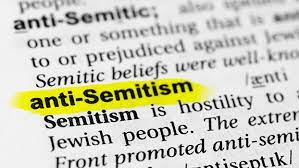How many times have you read or heard that the IHRA Working Definition of antisemitism is constantly used to silence or prevent criticism of the State of Israel by calling it antisemitism.
However this is untrue!! The IHRA definition expressly recognises that criticism of Israel, in a similar way to criticising any other country, cannot and is not regarded as antisemitic and in the past 30+ weeks, the citizens of Israel have clearly demonstrated that they can democratically criticise the government of Israel and they are clearly not antisemitic.
What therefore is the International Holocaust Remembrance Alliance (IHRA) and why is there a requirement for a definition of antisemitism.
The IHRA is the only intergovernmental organisation mandated to focus solely on Holocaust-related issues. With evidence that antisemitism is once again on the rise, there is a clear need to combat it but in order to do so, there has to be clarity about what antisemitism is.
In 2016, faced with this rise in antisemitism, the IHRA’s Committee on Antisemitism and Holocaust Denial built international consensus around a non-legally binding working definition of antisemitism. By doing so, the IHRA definition, below, has helped countries, institutions, organisations and companies recognise, monitor and record antisemitic incidents, statements and attacks.
“Antisemitism is a certain perception of Jews, which may be expressed as hatred toward Jews. Rhetorical and physical manifestations of antisemitism are directed toward Jewish or non-Jewish individuals and/or their property, toward Jewish community institutions and religious facilities.”
Manifestations might include the targeting of the State of Israel, conceived as a Jewish entity. As mentioned above, criticism of Israel similar to that made against any other country cannot be regarded as antisemitic. Antisemitism frequently charges Jews with conspiring to harm humanity, and it is often used to blame Jews for “why things go wrong.” This can be expressed in speech, writing, visual forms and action, and employs sinister stereotypes and negative character traits.
In recent years, anti-Zionism has become the new antisemitism. In 2016, Rabbi Jonathan Sacks stated “In the Middle Ages, Jews were hated because of their religion. In the 19th and 20th centuries they were hated because of their race. Today they are hated because of their nation-state, Israel. Anti-Zionism is the new anti-Semitism.”
In order to provide a guide as to what can be antisemitic, the IHRA provided examples to illustrate what may constitute antisemitism. These contemporary examples can apply in public life, the media, the workplace and in the religious sphere. and due to the steady rise in antisemitism being disguised as anti-Zionism, seven of the eleven examples apply to Israel and depending on the context, could become antisemitic.
§ Calling for, aiding, or justifying the killing or harming of Jews in the name of a radical ideology or an extremist view of religion.
§ Making mendacious, dehumanising, demonising, or stereotypical allegations about Jews as such or the power of Jews as collective — such as, especially but not exclusively, the myth about a world Jewish conspiracy or of Jews controlling the media, economy, government or other societal institutions.
§ Accusing Jews as a people of being responsible for real or imagined wrongdoing committed by a single Jewish person or group, or even for acts committed by non-Jews.
§ Denying the fact, scope, mechanisms (e.g. gas chambers) or intentionality of the genocide of the Jewish people at the hands of National Socialist Germany and its supporters and accomplices during World War II (the Holocaust).
§ Accusing the Jews as a people, or Israel as a state, of inventing or exaggerating the Holocaust.
§ Accusing Jewish citizens of being more loyal to Israel, or to the alleged priorities of Jews worldwide, than to the interests of their own nations.
§ Denying the Jewish people their right to self-determination, e.g., by claiming that the existence of a State of Israel is a racist endeavour.
§ Applying double standards by requiring of it a behaviour not expected or demanded of any other democratic nation.
§ Using the symbols and images associated with classic antisemitism (e.g., claims of Jews killing Jesus or blood libel) to characterise Israel or Israelis.
§ Drawing comparisons of contemporary Israeli policy to that of the Nazis.
§ Holding Jews collectively responsible for actions of the State of Israel.
But these examples are not etched in stone. They simply serve as guidelines, so critics can distinguish between criticising national policies, which are totally acceptable and denying the Jewish people’s right to self-determination which is not acceptable. In fact, certain countries such as Spain and Sweden that have delivered stinging criticism of the Jewish state have embraced the definition as a useful tool.
It must also be remembered that Antisemitic acts are criminal when they are so defined by law such as the denial of the Holocaust or distribution of antisemitic materials in some countries. Also, criminal acts are antisemitic when the targets of attacks, whether they are people or property – such as buildings, schools, places of worship and cemeteries – are selected because they are, or are perceived to be, Jewish or linked to Jews.
Closer to home, the UK Government formally adopted the IHRA’s working definition of antisemitism on 12 December 2016. In a speech that day, Prime Minister Theresa May said the adoption meant:
“There will be one definition of antisemitism – in essence, language or behaviour that displays hatred towards Jews because they are Jews – and anyone guilty of that will be called out on it.”
The Scottish Government has also formally adopted the IHRA definition of antisemitism in June 2017. The adoption included all of the accompanying examples of contemporary antisemitism provided by the IHRA.
The IHRA Definition of antisemitism should therefore be an essential element in the ongoing fight against this oldest hatred.
Next time you hear someone complain that the IHRA Definition is just an attempt to censor criticism of the State of Israel by labelling it as antisemitism, hopefully, a better understanding of this definition will help clarify the situation.

